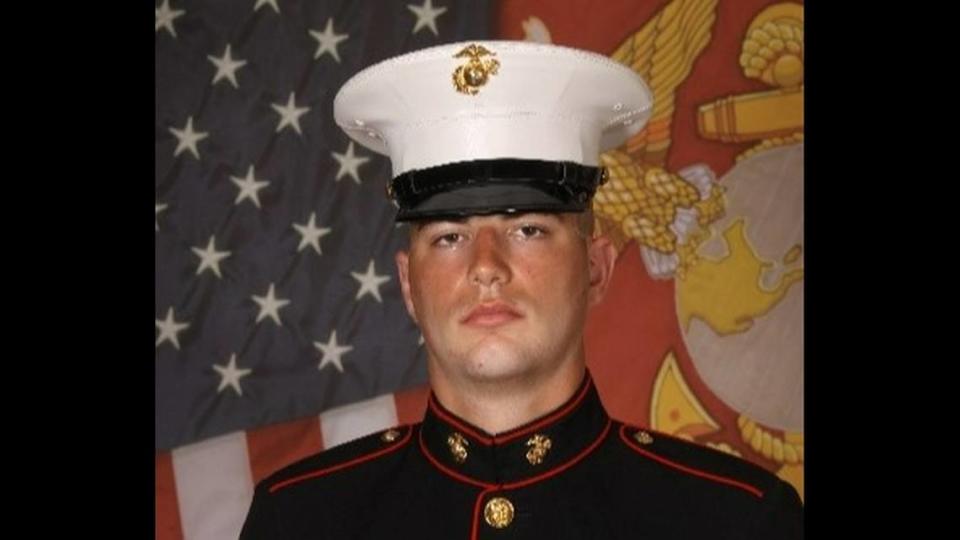Is Marine drill instructor scapegoat? Or did he cause recruit’s death? Fate in jury’s hands
Staff Sgt. Steven Smiley’s fate is in the hands of an eight-person jury.
Closing arguments in the Marine drill instructor’s negligent homicide trial came Friday.
The trial put the Marine training known as the Crucible — a 54-hour event that tests physical stamina, mental toughness or recruits before they graduate as Marines — in the spotlight.
Dalton Beals, a 19-year-old from New Jersey, died on the second day of the Crucible on June 4, 2021.
In November 2022, the government charged Smiley, his drill instructor, with negligent homicide; dereliction of duty resulting in death; obstruction of justice; cruelty, oppression or maltreatment of subordinates; violation of a lawful general order and dereliction in the performances of his duties.
Smiley didn’t do his job and was out to “break” Marines in “my Crucible,” pushing recruits too far in the hot South Carolina heat by ordering extra exercises, Lt. Col. Ian Germain, of the prosecution, said during his final argument.
But Smiley failed to recognize clear signs of heat exhaustion in Beals and ignored a warning from a recruit who tried to inform him Beals was missing, with his negligence leading to his death, Germain said.
“There was no reason for this killing,” Germain said. “It was unlawful.”
Smiley is not a criminal, Colby Vokey, one of Smiley’s attorneys said in the defense team’s final argument. He was a marine drill instructor doing his job.
“If the conditions of the Crucible are hot or difficult, that doesn’t fall on Staff Sgt. Smiley,” Vokey said.
Much of the trial focused on how Beals died, then dueling testimony from doctors who disagreed on the cause. Government medical experts said he died of heat stroke. The defense said it was a preexisting heart condition. Both sides spent time trying to discredit the testimony of the other side’s medical experts.
The rest of the trial focused on Smiley’s supervision of his recruits during the Crucible.
Germain, the government prosecutor, said Smiley was out to “break recruits” not make Marines, a reference to the military branch’s slogan, “We make Marines.”
He focused on two statements Smiley made during the Crucible.
One came when another recruit —not Beals — went down with heat illness. One of Smiley’s recruits, the leader of his team, approached him to inquire whether the “man down” call was about Beals, who at that time was missing.
“Don’t worry about that,” Smiley told the team leader. “Matter of fact, get outta my face. You are fired.”
Smiley, Germain said, didn’t ask any questions. Later, Beals was found dead. He had been missing for an hour to an hour-and-a-half, Germain said.
Another statement Smiley made came after Beals was pronounced dead. “There goes my f______ career,” said Germain to the jury, repeating what Smiley was heard saying.
Germain also noted that Smiley had approached Beals earlier and asked how he was doing, looking him in the face and saying, “What is wrong with us?” Smiley left when Beals told him he was fine and just tired.
“Dalton Beals was entrusted to Steven Smiley who treated him like he was going to break him not make him and that’s why we are here,” said Germain, his voice rising.
Vokey, Smiley’s attorney, painted a vastly different picture of what happened that day. He said the prosecution cherry-picked the evidence.
“It’s cherry-picking and it’s twisting of the worst kind,” Vokey said.
Smiley, he said, was not responsible for Beals’ death.
Part of the time Beals was missing, Vokey noted Smiley was assisting with another recruit who had dropped in the heat.
Vokey told the jury to send a message “we expect drill instructors to train Marines to do the right things but we won’t make one a scapegoat because of a tragic event.”
Imagine how Smiley feels, accused of being a criminal for performing his duties as a drill instructor. “How scary is that?” Vokey said.
All of the recruits that day were suffering in the heat, he said. “It’s the Crucible,” he said.
Throughout the trial, the front row was reserved for the family — with Beals’ mother, father and sisters seated on one side, and Smiley’s family, including his parents and wife, seated on the other.
The eight-person jury must agree beyond a reasonable doubt that Smiley was guilty of each of the charges. Unlike a civilian jury, which require a unanimous verdict, in this military trial, two-thirds of the jury or six people must agree to hand up a conviction.
As of 4:30 p.m. Friday, the jury still considering the the case.
Since being charged, Smiley has remained working but he was removed from drill instructor duties.


